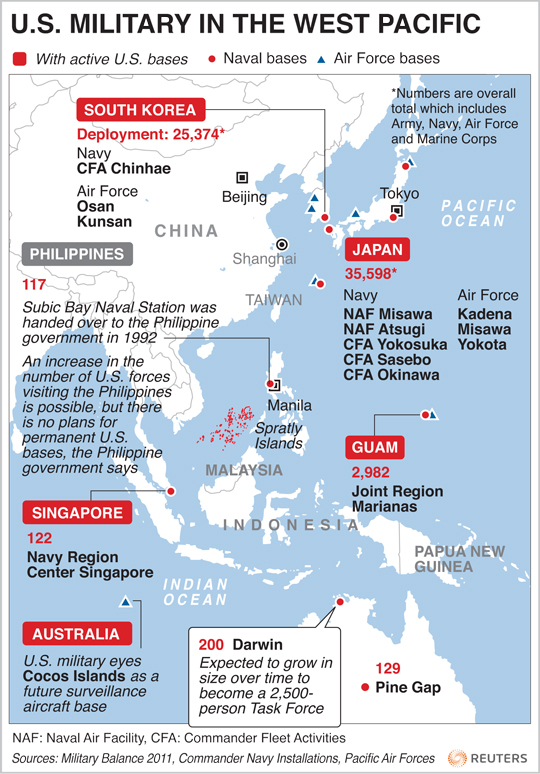Jura The idiot
General
now I read Duterte Shakes Up Relations with US, Shores Them Up with China
source:The Philippines' new president is cozying up to Beijing and sending mixed messages on existing U.S. troop agreements.
While the world is transfixed by the Duterte administration’s on the drug trade, which has drawn global condemnation for its alleged widespread use of extrajudicial killings yet enjoys significant domestic support, the newly-inaugurated President Rodrigo Duterte, a , is also shaking up Philippine foreign policy. So far, however, under the country’s new firebrand leader, the country has seen more change than continuity in its foreign policy.
Earlier this year, before the presidential campaign formally kicked off, the Philippines was generally regarded as one of the stronger liberal democracies in Asia, as well as a vibrant emerging market and a staunch ally of the United States. The United States and the Philippines are treaty allies, but under the previous Aquino administration, Washington and Manila signed a new bilateral defense pact, and U.S. security assistance to the Philippines rose markedly.
A new administration in Manila, however, is rapidly reshaping the country’s domestic politics, but its impact on foreign policy remains unclear. When it comes to Duterte’s overheated rhetoric, sometimes it seems he really means what he says, as evidently shown in his campaign. As president, he has followed through on the promises to combat the drug trade, even through extralegal means, that he made on the campaign trail.
Shortly after his election victory, Duterte , “I will be charting a [new] course [for the Philippines] on its own and will not be dependent on the United States.” Since then, when it comes to relations with Washington, the new president has broken one diplomatic taboo after the other. On multiple occasions, he has America’s commitment to come to the Philippines’ aid in an event of conflict in the South China Sea. He has intimated that he will put new restrictions on the movement of American military personnel on Philippine soil, though vowed to honor existing bilateral security agreements.
So far, the Obama administration has tried to walk a diplomatic tightrope with Duterte, generally avoiding any criticism of the new Philippine government. In fact, President Barack Obama was the first head of state to call Duterte and congratulate him upon his election victory. Secretary of State John Kerry made a trip to Manila shortly after the new Philippine president was inaugurated. Washington has begun, though in a carefully crafted language, to criticize Duterte on human rights concerns. President Obama is expected to raise the issue again when he meets the Philippine leader at the upcoming Association of Southeast Asian Nations (ASEAN) summit.
Yet Washington’s diplomatic outreach apparently has neither prevented Duterte from the American ambassador nor impacted Duterte’s domestic political agenda. If anything, Duterte has moved closer to China in recent months, extending an olive branch to China, despite the latter’s refusal to even acknowledge a United Nations Convention on the Law of the Sea (UNCLOS) this summer, which debunked the bulk of Beijing’s claims over the South China Sea.
Over the past few months, Duterte Chinese Ambassador to the Philippines Zhao Jinhua more than any other diplomatic envoy in Manila. The two met shortly before the final award from The Hague was announced. By all indications, the exchanges were cordial and intimate, underlining the Duterte administration’s determination to renormalize relations with Beijing after years of icy relations under the Aquino government. In recent months, Beijing large-scale investments in Philippine infrastructure, including in Mindanao, where Duterte served as mayor of Davao for decades.
To ensure maximum diplomatic success, Duterte has appointed former President Fidel Ramos, who deftly managed South China Sea disputes in the mid-1990s and maintains friendly relations with Beijing leaders, as special envoy to China. After a visit to Hong Kong, where he informally met a senior Chinese official, Ramos received an invitation for direct talks in Beijing. Duterte himself will likely meet Chinese Premier Li Keqiang on the sidelines of the ASEAN in Laos, paving the way for a potential state visit by Duterte to Beijing later this year. A joint fisheries agreement in the Scarborough Shoal, which is consistent with The Hague ruling, is one potential compromise on the horizon.
To ensure smooth progress in his diplomatic outreach to China, the Duterte administration has and has sought to the disputes by not vigorously raising the South China Sea disputes in the ASEAN. Obviously, improved ties between the Philippines and China aren’t necessarily inimical to American interests, since the Obama administration has welcomed diplomatic resolution of regional disputes. But Duterte’s approach to the United States has certainly raised eyebrows in Washington.









